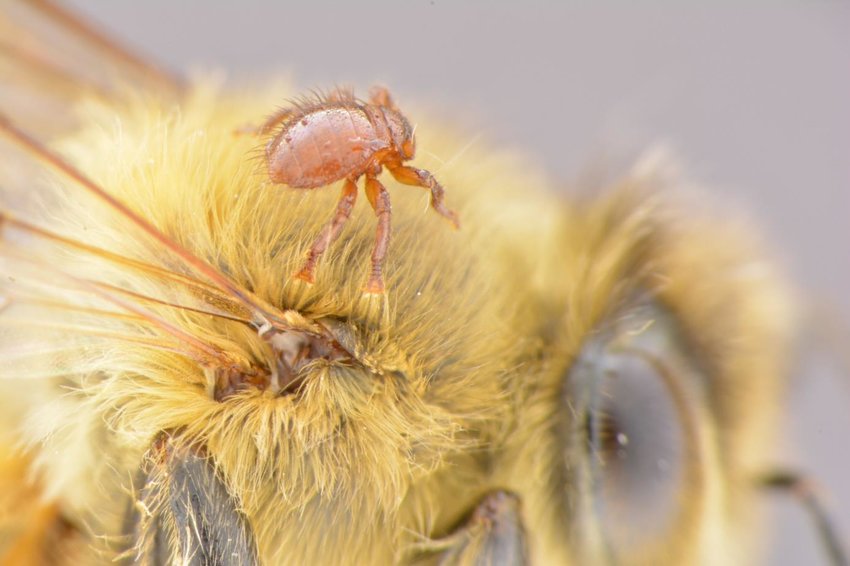Industry Update
28 August 2022INDUSTRY MEETING AHBIC will be holding an open industry meeting on Wednesday 31st August at 6pm AEST via Zoom. This will be a Zoom meeting hosted by AHBIC and will […]

INDUSTRY MEETING
AHBIC will be holding an open industry meeting on Wednesday 31st August at 6pm AEST via Zoom. This will be a Zoom meeting hosted by AHBIC and will have DPI representatives from the NSW incident control response team to talk about selected topics. You will need to register for the free event here:
BRAULA FLY DECTECTION IN VICTORIA
Field crews that have been conducting surveillance for Varroa mite in the Sunraysia region have detected some hives with Braula Fly. This detection in 18 of 38 hives on almond pollination indicates it is established and surveillance of surrounding hives has resulted in no further detections.
Braula Fly is endemic in Tasmania and is considered to not cause economical damage to beekeepers. The fly is endemic in every continent in the world and is not known to cause any issues with honey bee health.
AHBIC is working with AgVic to determine the pathway forward including determining the likely source of the mite through tracing and other activities. AHBIC is gathering information to determine if the detection will have any impact on international markets and domestic movements. We will keep the industry updated once the course of action is determined.
NEW SOUTH WALES
Updated Emergency Zones
Please see the NSW DPIs FAQs page regarding what is permitted in each zone under the Biosecurity Emergency Order.
Infested Premises
We are sixty-six days into the Varroa mite emergency response. The total number of Infested Premises (IPs) remains at 99, with no new IPs detected for seven days now. This is good news and shows the zone of infestation is now well understood and delineated.
Eradication efforts in the Hunter region continue, with over 26,000 hives inspected and 8,000 euthanised to date. Surveillance work in Narrabri and Nana Glen also continues, in tandem with key locations where pollination services are underway.
The Narrabri and Nana Glen surveillance involving the use of alcohol washes, with negative results now being confirmed using strips and sticky mats. No mites have been detected in surveillance.
There were 2,035 strips and sticky mats applied to hives at the almond pollination event in August. Most pleasingly, there were no detections of mites.
The priority of the response is now moving to the control of feral colonies in eradication zones, following a concerted effort to euthanase and remove managed colonies in the red eradication zones.
Reimbursement Program
An $18 million support package has been developed for registered commercial beekeepers affected by the Varroa mite outbreak under an agreement reached by the NSW and Australian governments and apiary industry bodies. In addition, there is also a $1.65 million package for recreational beekeepers.
The program aims to reimburse eligible registered commercial beekeepers for hives affected by biosecurity operations to control the declared Varroa mite biosecurity emergency. Registered recreational beekeepers will also be reimbursed for destroyed hives through a separate program.
For more detail visit the reimbursement page.
QUEENSLAND
New Movement Control Order
All registered beekeepers should now have information relating to the new movement control order from DAF. If for some reason you are not receiving RBE (Registered Biosecurity Entity) emails, please contact DAF on 13 25 23 to confirm your contact information.
Hive Repatriation
Movement of hives and hive material into Queensland from New South Wales remains prohibited. Although DAF is working nationally with other States on risk assessments that hopefully will see protocols for hive repatriation and business continuity.
QBA are asking for beekeepers who currently have QLD based hives stranded in NSW to come forward with this information. If you have hives stranded, please contact us or the QBA directly via Jo Martin on 0498 000 496 or statesecretary@qbabees.org.au. This activity is to is to build an accurate profile of the true situation in order to assist with bringing stranded hives home.
BEE 123
The Queensland Government has Launched the BEE 123 reporting tool. This tool has been very useful in collecting Varroa surveillance data in QLD. We encourage our QLD beekeepers to participate in sampling at least 10% of hives and reporting these checks. Learn how to use the app here or report your checks via the online survey here.
SOUTH AUSTRALIA
Restrictions remain in place for bees, hives, and associated beekeeping products and beekeeping property into South Australia from New South Wales. These items cannot be brought into South Australia without written permission of the Chief Inspector of Stock. More information is provided via PIRSA’s website.
VICTORIA
Restrictions remain in place to prohibit the movement of bees, hives or beekeeping equipment into Victoria from New South Wales without a permit. You can apply for a permit online at: www.agriculture.vic.gov.au/varroa
If you cannot apply online, please email Honeybee.Permits@agriculture.vic.gov.au or phone the Customer Contact Centre on 136 186.
For the most up-to-date information on movement requirements for Vitoria, please refer to the Agriculture Victoria website.
